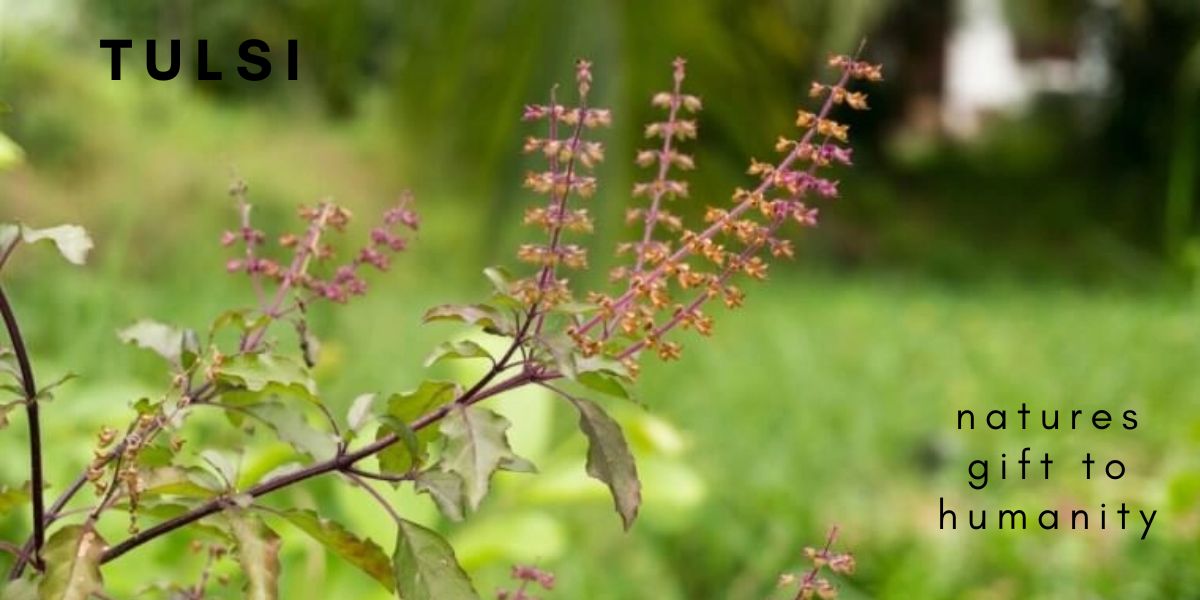By Dimple Jani Ayurvedic Practitioner @ IAM.
Tulsi (Ocimum santum L.), the queen of herbs, aka Holy Basil, plays a crucial role in Ayurvedic medicine, in ritual and kitchen because of its healing and satvic properties. (it is pungent, bitter, light, dry, sharp and warm ) As spring sets in, the blooming season is on the rise, and you are planning on having an herb garden, then Tulsi is a must-have herb, it is very easy to grow in a pot or in ground in warmer climates. Out of the different types of tulsi: Shukla, Krishna, Rama, Vana; Rama tulsi is the easiest to grow and it surrounds our clinic growing abundantly all year long. Tulsi is a powerful healing herb that cures many ailments and is Vata and Kapha balancing, ( the words should link to what is vata, pitta kapha page). Tulsi has anti-inflammatory, immune boosting, antibacterial, and antiviral properties. Tulsi leaves are used for colds and coughs (helps in clearing the mucus), stomach problems (cramps, vomiting, and diarrhea), help in lowering blood pressure, treat respiratory illnesses (asthma and bronchitis), and assist in managing stress and anxiety. Tulsi has been shown to reduce the ill effects of radiotherapy Lastly, perhaps because it is so medicinal Tulsi is worshiped where all parts of the plant are used for religious purposes. Read on the many uses of this sacred plant and you will agree Tulsi is regarded as a great plant for Humanity!
- Healing Power: The leaves are a nerve tonic and also sharpen memory and improves cognitive function . They promote the removal of the catarrhal matter and phlegm from the bronchial tube. The leaves strengthen the stomach and induce copious perspiration. The seed of the plant are mucilaginous. This is one of the main herbs in our memory tea.
- Fever & Common Cold: The leaves of basil are specific for many fevers. During the rainy season in India, when malaria and dengue fever are widely prevalent, tulsi tea is a used as prevention. In case of acute fevers, a decoction of the leaves boiled in water and little milk with cardamom, then stir in honey or simple make juice of tulsi leaves to bring down fever.
- Coughs: an important constituent of many Ayurvedic cough syrups and expectorants, tulsi helps to mobilize mucus in bronchitis and asthma. Chewing tulsi leaves relieves cold and flu.
- Sore Throat: Water boiled with basil leaves can be taken as drink or gargle in case of sore throat.
- Respiratory Disorder: useful in the treatment of respiratory conditions. A decoction of the leaves, cloves and ginger with honey is an effective remedy for bronchitis, asthma, influenza, cough and cold. Sanctuary makes a special immunity tea with organic tulsi grown in our own backyard along with many other herbs to provide both symptomatic relief and quick recovery of any cold or flu conditions.
- Kidney Stone: Basil has strengthening effect on the kidney. In case of renal stone the juice of basil leaves and honey, if taken regularly for 6 months it will expel them via the urinary tract.
- Heart Disorder: Basil has a beneficial effect in cardiac disease and the weakness resulting from them. It reduces the level of blood cholesterol. However it does have blood thinning action so best to avoid before any surgery
- Children’s Ailments: Common pediatric problems like cough cold, fever, diarrhea and vomiting respond favorably to the juice of basil leaves.
- Stress: Basil leaves are regarded as an ‘adaptogen’ or anti-stress agent. Recent studies have shown that the leaves afford significant protection against stress. Even healthy persons can chew 12 leaves of basil, twice a day, to prevent stress. It has also been shown to reduce anxiety and depression in several research studies in India.
- Mouth Infections: The leaves are effective for the ulcer and infections in the mouth. Just Chew fresh leaves.
- Insect Bites: The herb is a prophylactic or preventive and curative for insect stings or bites. A teaspoonful of the juice of the leaves is taken and is repeated after a few hours. Fresh juice must also be applied to the affected parts.
- Skin Disorders: Applied locally, basil juice is beneficial in the treatment of ringworm and other skin diseases.
- Teeth Disorder: The herb is useful in teeth disorders. tulsi powder can be used for brushing teeth. It can also be mixed with mustered oil to make a paste and used as toothpaste. This is very good for maintaining dental health, counteracting bad breath and for massaging the gums. It is also useful in pyorrhea and other teeth disorders.
- Headaches: Basil makes a good medicine for headache. Pounded leaves mixed with sandalwood paste can also be applied on the forehead for getting relief from heat, headache, and for providing coolness in general.
- Hair care: for hair loss, dandruff, premature greying rejuvenating the hair follicles and strengthening the roots, promotes circulation in your scalp and keeps it cool. We use tulsi as one of the ingredients in our hand crafted hair oils along with neem, curry leaves, fenugreek, amla, bringraj, brahmi and rosemary for an incredibly nourishing treatment for scalp and hair. infact we use this for our scalp massage treatments.
Dimple is available for in person and online Health Consults at the Institute Of Ayurvedic Medicine. Click on the following link to make an appointment: https://institute4ayurveda.com/clinic/
REFERENCES:
A Review Medicinal and Traditional Uses on Tulsi Plant (Ocimum Sanctum L.). https://www.researchgate.net/publication/368253712_A_review_medicinal_and_traditional_uses_on_Tulsi_plant_Ocimum_sanctum_L

